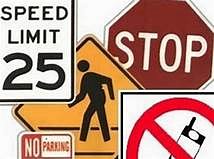How to Avoid and Manage Penalty Charge Notices (PCN’s)
Release Date:

Research Local Road Safety and Traffic Rules Before You Travel
When travelling abroad it is advisable that you research the local road safety and traffic rules before you travel. While you may have the best intentions, if you don’t know the rules of the road in the country you’re driving in, you could inadvertently break the law, resulting in a fine or your licence being confiscated:
- Different speed limits apply to different types of roads, so it is worthwhile looking up the speed limit on motorways, residential areas and dual carriageways where you are going to be travelling. Also remember that speeds can be in either miles/h or kilometres/h, depending on the country in which you are travelling, so best to work out a quick conversion before you set off.
- In some countries, the use of daytime running lights and/or winter tyres is mandatory.
- The maximum permitted blood alcohol level varies -some countries do not allow any alcohol in the blood while driving – ensure that you know what the limits are.
- Use of a mobile phone (calling or texting) whilst driving is forbidden in most countries.
- Each country or state has its own rules and regulations about child seats (it is the renter’s responsibility to arrange and fit these) and seatbelt laws.
- Specific local parking rules and regulations often apply and these can be easily overlooked or misunderstood in a foreign country.
- Toll and congestion charges (such as those in London, UK) may often need to be paid for within a specified time frame,
otherwise a PCN will be issued by the governing authority.
The Laws Regarding Traffic Offences, Fines and Parking Tickets
In most countries, drivers abroad only face fines when stopped by a police officer roadside, where on the spot fines are issued for ‘moving offences’ such as speeding and jumping a traffic light or stop sign. However, new measures (such as those applied in certain EU countries) are being implemented to improve road safety including the clamping down on traffic offences committed in another country.
This means that if you commit a driving offence when in another country, you could find yourself receiving the fine by post after your journey. The chances of this happening depend largely on where the offence was committed, and the vehicle you were driving. If driving a hire car, that can be traced back to the rental company, then they will typically pass this back to you as part of your contractual terms and conditions of hire.
How Rental Companies Deal With Fines
The way in which a car rental company handles offences committed in their vehicles varies by company and country and will depend largely on the governing country’s law in which the offence was committed as to whether, as the owner of the vehicle, they will end up being held liable for the fine.
In some countries, the driver of a vehicle is liable for ‘moving offences’ so the rental company can just pass on your details and not incur the fine themselves. However, when parking fines are applied, it is the owner of the vehicle that is held liable and the car rental company will pass this on to the person in possession of the car at the time of the fine being applied.
The policy of the car rental company will clearly state in the terms and conditions of hire, what their policy is regarding fines and parking tickets, in addition to the management thereof. Most rental companies will charge an administration fee for the handling and management of these Penalty Charge Notices (PCN’s).
If You Incur a Fine Whilst Abroad, It Is Worthwhile Knowing That:
- The terms and condition of your rental contract will usually stipulate that it is ultimately your legal responsibility to pay for any PCN (speeding, parking and other fines) incurred during your period of rental.
- If you receive a fine during your rental period you should notify the car rental company at the time of returning the vehicle.
- When a car rental company receives a PCN, this will often have to be passed through many administration channels before it is ultimately sent on to the responsible customer. Additionally, in smaller firms where there is no dedicated customer service team, the car rental company will need to use an agency to manage these. This all incurs a cost which is why car rental companies typically charge a fixed administration fee.
- Even if you manage to get your fine revoked by the issuing authority, the car rental company will still expect you to pay the administration fee for handling the original fine.





